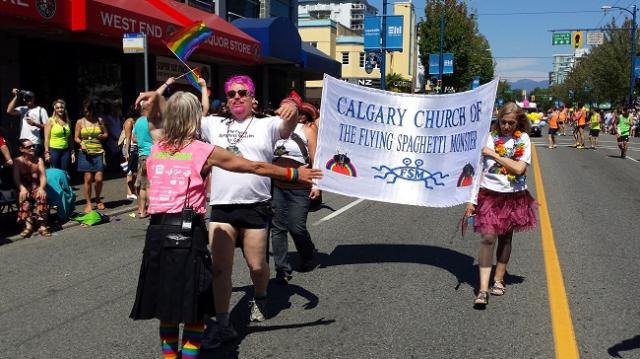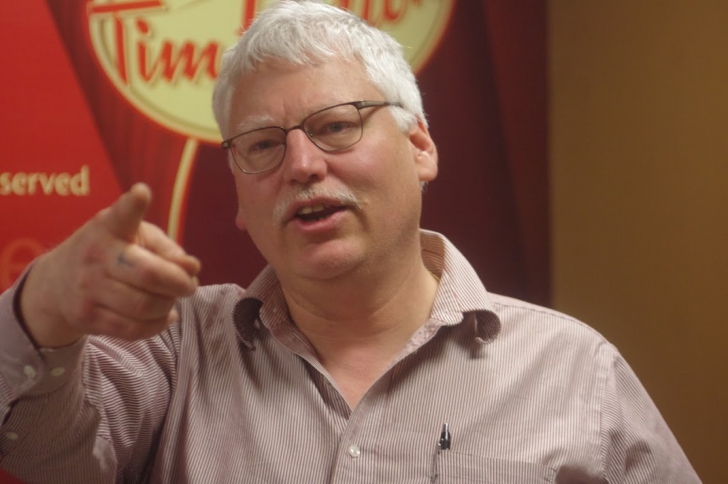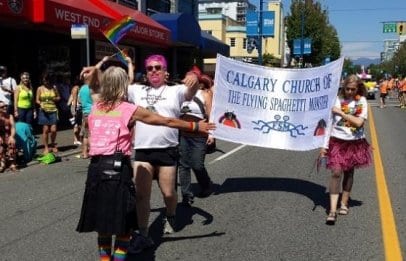
An evangelical activist, who for years denounced homosexuality in Canada, says more Christians are willing to support his crusade against abortion than take a public stand against gay rights.
“Some pro-lifers disassociated from me when I spoke on homosexuality,” Bill Whatcott tells Daily Xtra. “And some are even quite willing to align themselves with the pro-gay lobby and call me a wingnut for speaking on that issue.
“So I kind of saw the need to speak on that issue,” he says, though he acknowledges that many Christians lack the “energy and wherewithal” to share his calling.
There’s more room for dissention on abortion than homosexuality in Canada, Whatcott suggests. Pro-choice advocates have yet to achieve the same success as gay advocates in changing society, he believes, while a succession of legislative and judicial decisions has cast a chill over those Christians who might otherwise speak out against gay rights.
Undeterred for more than a decade, Whatcott has finally decided to “pack it in.”
After years of distributing contentious flyers and speaking publicly against both homosexuality and abortion — and, most recently, sneaking into the Vancouver Pride parade under the banner of the fictitious Calgary Church of the Flying Spaghetti Monster to distribute anti-gay leaflets disguised as condoms — Whatcott announced March 10 that he was leaving Canada to join his wife in the Philippines. He describes his activism here as a “mixed bag” of wins and losses.
“On a practical level it seemed as good a time to leave as any,” Whatcott says via Skype from his new home in Lipa City in Batangas province, south of Manila. “I was unemployed and living off of donations. I’m not Jimmy Swaggart so I wasn’t going to get rich.”
“I don’t know that I’m here forever,” he says. “I might be somewhere else in five years, but right now I’m mostly taking a rest.”
Whatcott has moved in with his wife Joni, whom he met online in 2007 and married in 2011. “She supported me ever since she’s known me in these court battles and occasionally being thrown in jail, being fined, banned and whatever else,” he says. “She kind of put up with seeing me maybe once a year for all this time and she’s been faithful and lonely so I kind of think I owed it to her to finally pack it in.”

(Bill Whatcott stops in Vancouver prior to his departure for the Philippines in March 2015./Nathaniel Christopher photo)
In 2013 the Supreme Court of Canada upheld part of a 2005 Saskatchewan Human Rights Tribunal ruling against Whatcott for distributing flyers targeting gays and lesbians. The high court unanimously ruled that two of the four flyers violated the Saskatchewan Human Rights Code, and ordered Whatcott to pay a fine as well as court costs. He doesn’t know the exact total but says it’s likely a six-digit figure.
“I can go a year at a time with being maligned and having nobody agree with me when I put out my flyers,” he says. “I kind of saw it more as a prophetic ministry than a results-driven ministry.
“I think speaking truth always has a power within itself,” he says, “but the primary motivator to me was the concern as I saw it that Canada was losing its religious freedom and that Canada was, in my view, becoming more sexually decadent, and I certainly saw restrictions and a loss of free speech.”
In addition to his unsuccessful brush with the Saskatchewan Human Rights Tribunal, Whatcott had numerous run-ins with the law for speaking out against homosexuality and abortion. In April 2014 he and American anti-gay activist Peter LaBarbera were charged with mischief after they distributed flyers and displayed placards with anti-abortion and anti-gay messages at the University of Regina. In December 2014 they were found not guilty by the Provincial Court of Saskatchewan.
A decade earlier, Whatcott was found guilty of obstructing police after he refused to stop displaying graphic signs with images of aborted fetuses at a July 2002 protest in Prince Albert, Saskatchewan. That conviction was overturned in 2004 by the Saskatchewan court of Queen’s Bench.
Whatcott describes the gay rights movement as a major manifestation of a larger leftist movement that has marginalized Christian voices in the public arena. But he refutes the suggestion of a culture war between Evangelical Christians and gay rights advocates.
“I see it more as a war against God,” he says. “I do believe that some elements of the left and the homosexual lobby, even if they claim God doesn’t exist, are actually at war with him.”
Whatcott believes that religious resistance to a “homosexualized culture” will never be stamped out and that God — not the courts of law, nor public opinion — will have the final say.
“I think there’s more persecution of Christians on the horizon,” he predicts. “More Christians are going to lose their jobs, lose their businesses and lose their free speech. I think most are going to buckle but I think God will keep a remnant and I think eventually Canada will fall under God’s judgement. That’s what I believe. What that’s going to look like I don’t know, but it won’t be pretty.”
Though he says he failed in his attempt to “activate the church” in Canada, he still claims several victories that made his efforts worthwhile.
“There are children who are alive as a result of my ministry on abortion, and there are individual homosexuals who have given their life to Christ as a result of my work,” he says. “I see those as profound victories. There are many other victories I’ve won and they can’t be taken away from me.”
He says he’ll continue to reach out to gay people, but doesn’t expect much sympathy or understanding in return.
“I’ll always reach out to homosexuals but I’ve never seen a lot of grace coming from the homosexual side, with a few exceptions,” he says. “There are a few homosexuals who are libertarian and they comprise, in my experience, about one percent of the movement. But I don’t think light and darkness can ever co-exist. But it won’t be because I persecute homosexuals; it will be because homosexuals persecute me when I speak out.”

 Why you can trust Xtra
Why you can trust Xtra


